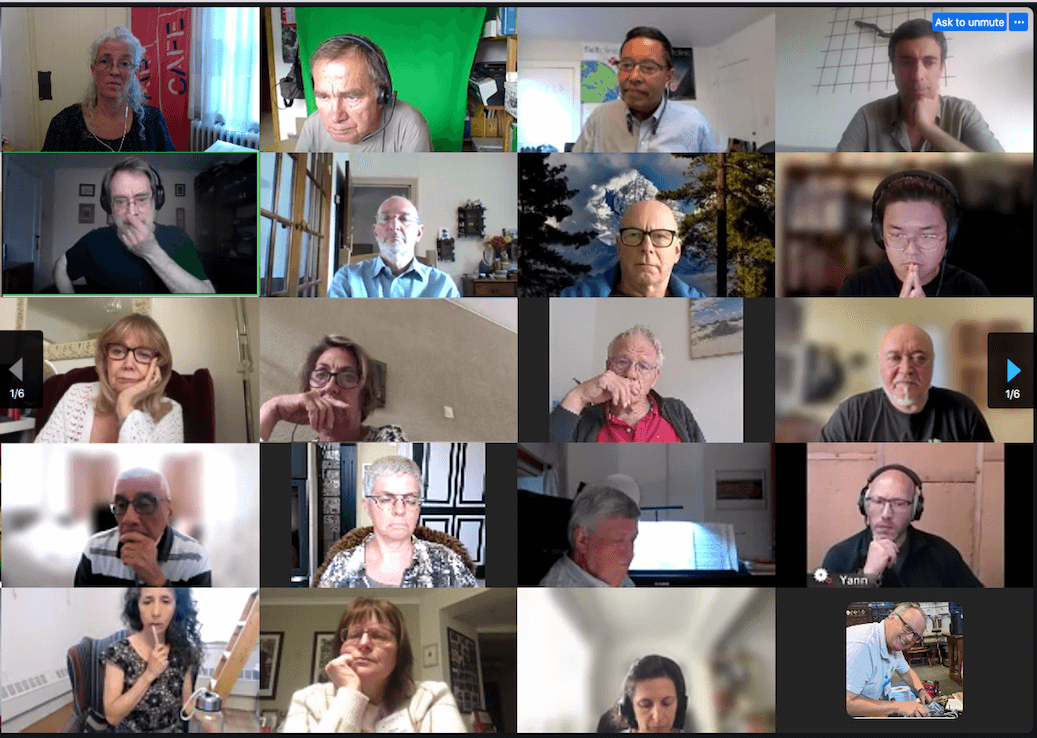
Almost 250 volunteers from Repair Cafés in 25 countries joined the fourth international Repair Café webinar on July 12. During this two hour event, they were updated on various topics relevant to the global Repair Café movement. The online meeting was recorded in its entirety and can be viewed on YouTube. In the following article you can read which topics were discussed.
Introduction by Martine Postma and Martin Charter
Hosts Martine Postma (Repair Café International Foundation, Netherlands) and Martin Charter (Centre for Sustainable Design, UK) opened the session by outlining several developments. Martine, for instance, signalled that the right to repair directive which the EU adopted earlier this year, is already beginning to change the minds of product manufacturers. “They are beginning to really think about repairability of their products, and several of them have contacted us to identify ways to collaborate”, Martine said.

Martin Charter shared key learnings from a recent Repair Café conference that he organised in the UK. He noted, for instance, that several Repair Cafés are experimenting with online booking versus pure drop in for their events. He also said that Repair Cafés are wondering how they can measure the social value of their activities.
Repair Café perspectives from Australia and New Zealand
After these introductions, the focus shifted to Repair Café developments in Australia and Aotearoa New Zealand. Leanne Wiseman, of the Australian Repair Network, talked about the diversity of repair activities in her country. “Our Repair Cafés take many different forms and play many different roles”, she said. Leanne also stressed the importance of repair data collection to show the impact of Repair Cafés to the local, state and federal governments in Australia.

Brigitte Sistig talked about the development of the Repair Network Aotearoa New Zealand, starting in 2020. She explained how repair appeared to be very likeable and how people are so passionate about it that there are now over 75 Repair Cafés in the country.
Data collection at Repair Cafés: how to do this and why is it important?
Subsequently, the webinar focused on data collection at repair events. Martine Postma explained how the RepairMonitor works, the online tool which Repair Café International developed for this goal. Participants from the Netherlands, Germany and the UK shared their experience using the monitor.
The broader perspective: combining datasets for campaigning activities
Ugo Vallauri of the Open Repair Alliance shared how the RepairMonitor dataset and other similar datasets are being combined into one large dataset which is used in campaigning activities for the right to repair. He also explained that the combined dataset is being downloaded and used by policy makers, companies, journalists and many more people and parties.

Finally, Peter Mui of Fixit Clinics – another community repair initiative – provided repair perspectives from the United States. He said that close to a quarter of the American population is now covered under some sort of right to repair legislation. And that in the last couple of years also at a federal level the idea has developed that repair is critical to a resilient economy. Fixit Clinics also share data with the Open Repair Alliance.
More information
- View the entire webinar on YouTube
- read more about the programma on the website of The Centre for Sustainable Design

This post has 0 comments